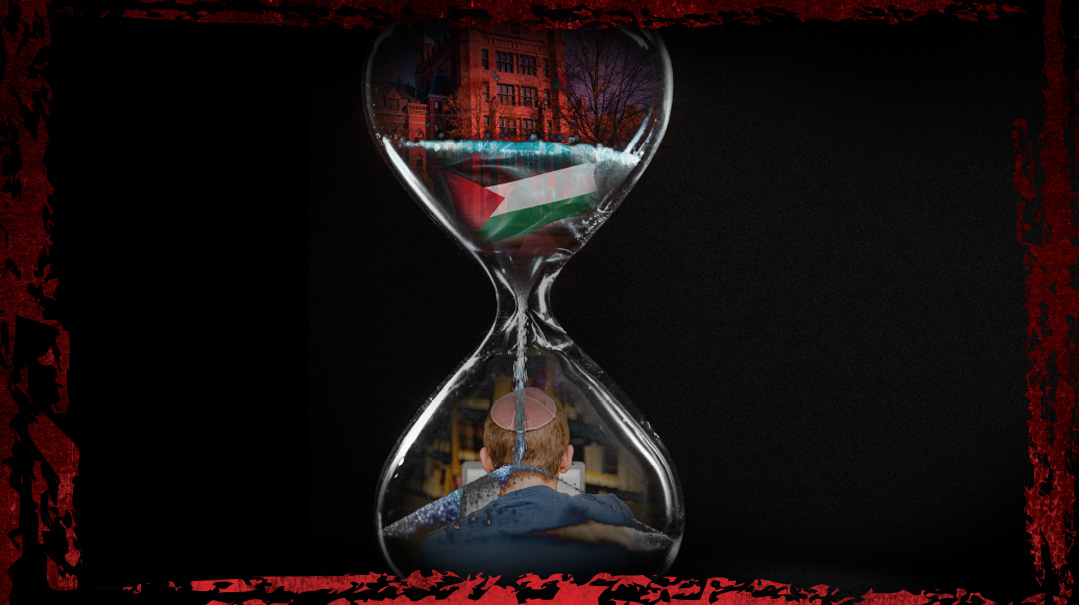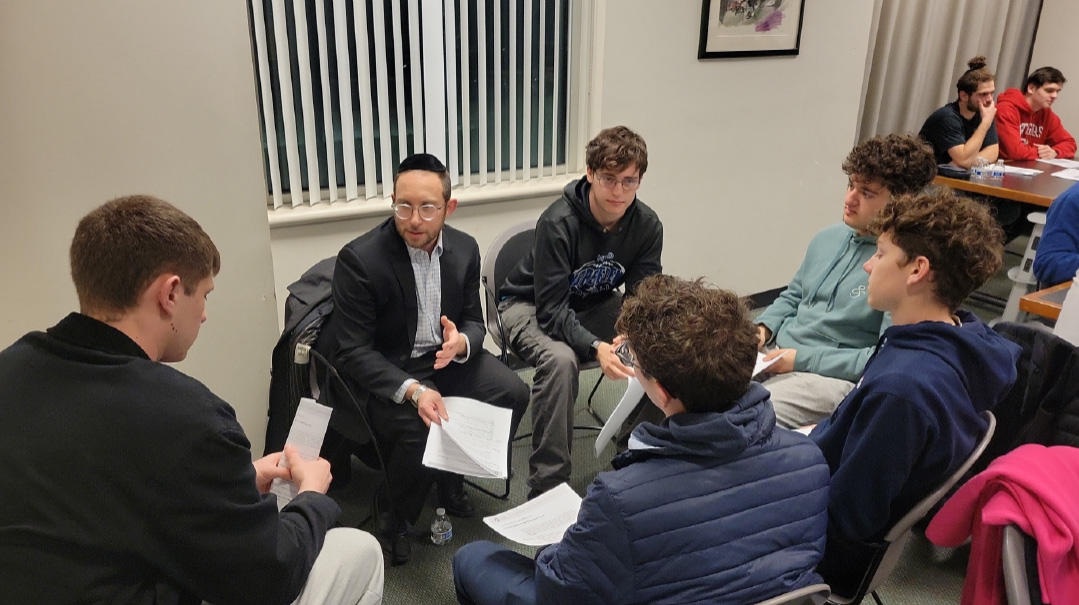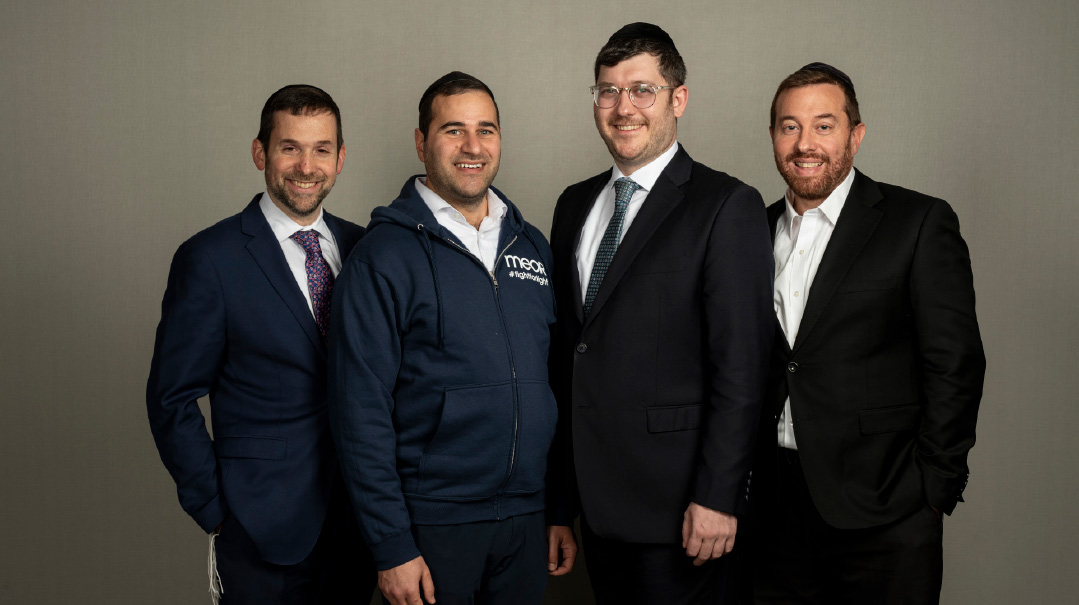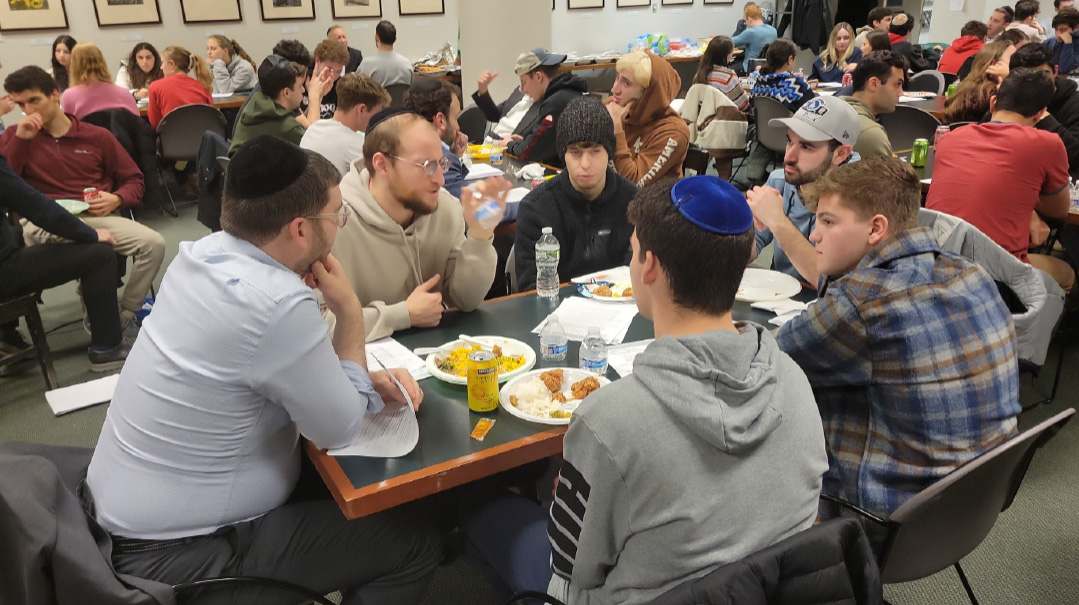The Moment Is Now
| February 27, 2024Targeted by campus hate, Jewish students dig back to their roots

Photos: Ruby Studios
It’s a dynamic that’s played out in Jewish history so many times… a spiritual airbag, if you will. When Jews don’t make Kiddush, the world makes Havdalah, and we’re painfully reminded of our unique status. Since October 7, there’s been much discussion about the blatant, horrifying anti-Semitism emerging on university campuses, to the point that Jewish students fear for their physical safety. But at the same time, the cycle is turning upward, as it inevitably does — and campus professionals report an enormous uptick of interest among students exploring their Jewish identity
ON October 7, Rutgers student Gabby Rubin, a proudly Jewish although non-observant sophomore, was studying in her room when her phone began ringing incessantly. It was her mother with terrible news: Hamas terrorists had infiltrated Israel’s security fence and were gleefully parading about on an indiscriminate killing spree, murdering and maiming thousands and taking hundreds hostage. Gabby broke down.
“I just started sobbing and stayed like that the rest of the day,” she recalls. But the next morning, Gabby, who is double majoring in political science and journalism, pulled herself together to go to class. When she got to campus, Gabby saw other students had gathered in protest — but not to support her brothers and sisters across the ocean, victims of a heinous slaughter. Instead, many in the crowd were waving Palestinian flags and sporting keffiyehs.
“That was the last thing I was expecting,” Gabby says. “I never thought anyone could support terrorists. Personally, I know the whole area in Israel, so I understand the reality in ways that I can’t expect from everyone — but how can you be on the other side?!”
That “protest” — held in the heart of an ostensibly inclusive and diversity-obsessed liberal university — shocked Gabby to the core.
“We said ‘Never Again’ — and here it is happening again, just in a different way. We are being attacked because we are Jewish. Not even because of what we believe, just because we are Jewish,” she says. “I’m an understanding person and I was trying to rationalize, but there was no way I could validate them, and nothing I could say to them.”
Gabby’s attempts to engage in dialogue fell on deaf ears.
“Even when someone would tell me it’s important to try to understand on both sides — to respect that there were civilian casualties — I would say things like this is not Israel versus Palestine, it’s Israel versus evil.”
Yet on campus, it felt very much like Israel — which easily translated into Jews — versus the Palestinian cause, and no one was backing up Gabby’s side.
“The SJP [Students for Justice in Palestine] demanded that Rutgers cut off ties with Israel,” Gabby remembers. She was aghast. And along with the horror at watching her classmates and colleagues suddenly turn sympathetic to a murderous cause, she felt betrayed. She’d marched in line with her fellow students for a host of social causes and had seen them as ideological peers, but now they openly supported a group that called for the destruction of her homeland and her people.

Text-based learning for the first time. Since October 7, every Jewish student has to figure out what side he’s on
Upheaval and Betrayal
Gabby, who grew up in Bergen County, New Jersey, was raised in a non-religious home, but she’s felt deeply connected to Israel and the Holocaust for as long as she can remember. After starting college in the fall of 2022, she also enrolled in Meor JX, an Olami affiliate that operates on college campuses and aims to help Jewish students connect more deeply with their Jewish identity. She attended the learning sessions, studied with a mentor, and even joined a trip to Poland in the winter of 2023.
Gabby found the trip deeply stirring.
“Seeing everything in real life was shocking,” she says. “It was an out-of-body experience, and the only high points were when the rabbis spoke to us about what we were fighting for.”
Standing on the cold and barren grounds of a Polish death camp, surrounded by foreboding barracks and the dreadful crematorium towering over the blood-soaked soil, she felt a fear ignite in her: Could something this terrible happen again? After returning home, something inside Gabby turned on.
“I started attending Friday night prayers and committed to lighting candles,” she recalls.
Now, after the horrors of Simchas Torah and her fellow students’ shocking betrayal, Gabby’s worst fears were coming true. She jumped onto her Instagram account and fired off a post:
I posted for BLM and supported you. I posted for abortion rights and supported you. But when I need my country, very few are here for me. Very few support the Jewish people.
My only fear is the Holocaust happening again, and this is exactly what I was scared of. Within the past two days, my life has changed. My perception of things has changed. What Hamas is capable of is sickening. I’ve never seen so many videos that have brought me to tears and made my heart wrench. After living there for a month, it became my second home. Israel has given me everything.
There is misinformation on social media. People are uninformed before they post. I’ve never been so proud to be a Jew in America advocating for the place and the people that I love so much. Israel is part of me, and if that gets taken away because of terrorists, it would destroy me.
I feel bad for the innocent Palestinians. Hamas is using the innocent Palestinian and Israeli people because they want power and will do whatever it takes to get what they want. People are disposable to them; all these lives don’t matter. This is not a fair fight.
This took place on the 50th anniversary of the Yom Kippur War. These are the most deaths the Jewish people have faced in one day since the end of the Holocaust. Six million Jews died in the Holocaust. The Holocaust happened over years. Six hundred+ and counting people died in one day.
This isn’t just Israel’s battle. This is a fight for humanity.
I feel so helpless in America. Every night, I’m sick to my stomach because I’m safe, and millions aren’t. None of those people deserve to die. Babies, elderly, children, teens, moms, dads. Everyone is disposable, and no life matters. People are missing. Families are breaking. I’m praying for them, but it doesn’t seem like enough.
Imagine how it feels to be unable to focus on school or work because you constantly fear. I can’t go to sleep properly, and I wake up multiple times throughout the night having nightmares. I will never stop explaining the fact that this isn’t Israel vs. Palestine, but Hamas vs. the world! We will get through this; I know we will. Am Yisroel Chai!
She signed off with an Israeli flag.
One day Gabby put on an Israel Defense Force jacket and strolled through the Rutgers campus. Two American-born students were sitting on a bench when they spotted her in the drab green uniform.
“Allahu Akbar!” one of them started yelling, as the other chanted, “From the river to the sea!” Gabby kept her head up and continued on, but she couldn’t get the horrifying reality out of her head.
Gabby isn’t the only one who has felt the stinging sense of betrayal in the days, weeks, and months since October 7. Perhaps the hardest-hit subsection of the American Jewish population is college students; their close proximity to members of the general public who tend to favor liberal ideologies has led them to feel the heat of anti-Semitism. With so many of their erstwhile friends rushing to don keffiyehs and wave the Palestinian flag, students are experiencing a crushing disillusionment as the myth of liberal acceptance dissipates before their eyes.
There’s also genuine fear. One student at Rutgers told Meor JX staff that she stopped hanging out in the common area in her dorm, preferring to keep a low profile out of fear of backlash against her for being Jewish.

Together with campus activists across the country, Meor JX leaders are responding to the new reality. (L-R) Rabbis Aharon Grossman, Shlomo Cohen, Mendy Brukirer and Meir Goldberg
Generations of Searchers
Between the fear for their safety and the breakdown of their ideologies, college kids are beginning to exhibit a seriousness and sincerity not typical for party-happy students.
“Many of their cousins back in Israel are fighting on the front lines,” explains Estie Drebin, an educator with Meor JX, and their cousins back in the States haven’t remained unmoved. This seismic shift has created a unique window of opportunity for outreach professionals on campus, many of whom have noticed a tsunami of interest in their programs.
Pre-October 7, Meor JX director, Rabbi Meir Goldberg, director, Rabbi Aaron Grossman, his co-director, Shlomo Cohen, director of operations and Mendy Brukirer, executive vice-president, spentt their days and nights thinking about how to bring more secular Jews closer to Torah, and they had the outreach process down to a science.
“We identify Jewish students by getting cues from last names or just friendly banter, and try to strike up a conversation. During that first take, we ask if they’d like to join our program and have a chance to explore their Jewish heritage further,” says Rabbi Grossman. A flurry of incentives sweeten the deal, including academic stipends and creative swag, a campus favorite.
While female mentors engage students in various Jewish themes and ideas, rabbis and mentors learn individually with young men from a curated packet with sources pertaining to traditional values. The learning is text-based, and the sources develop like a sugya, followed by thought-provoking questions to stimulate conversation. Questions and Torah sources range from Rishonim to contemporary seforim, clarifying the points raised and giving students their first taste of a chavrusa-style session.
The Meor JX team also hosts dozens of shabbatons in Lakewood and its environs, as well as trips to Europe and Israel, which often lead students to remark that they feel part of the Jewish people for the first time in their lives.
“It’s great if a student ends up enrolling in a yeshivah or seminary,” says Rabbi Goldberg, “but each student has to take their own path, and the rabbi or rebbetzin will encourage them to embark on the path most suitable for them and their religious growth.”
Still, even if students don’t take on observance, any encounter is a success, says Rabbi Cohen. And he has the numbers to prove it. “Without a Jewish presence on campus, we would estimate that most Jewish students would have had no problem marrying out of the faith,” he says, “yet almost 85 percent of our alumni are committed to finding a Jewish spouse after attending our programs.”
Outreach is inherently spiritual, but in the back offices, it’s serious business. Like NYPD staffers, rabbis are expected to painstakingly document their activities and provide numbers on all their events — how many students came to shiurim, how many attended shabbatons, how many registered for trips, and how many took on a chavrusa besides the Wednesday night program. The metrics, which are entered into the databases of sponsoring organizations, have showcased a slow, if steady, rise in the number of students joining the Jewish programs nationally over the past decade.
Yet what about the rise of ultraliberal values and social causes anathema to halachah? Has it made students more wary than ever of having anything to do with religion?
“Torah is timeless,” says Rabbi Brukirer. “Yes, universities are rife with movements and ideological trends, but no one initiates a conversation with a student about some taboo topic. You build a relationship and show that you care. Once that basis exists, you can introduce them to Torah.”
In fact, says Rabbi Goldberg, despite the headlines declaring Gen Z’s infatuation with secular values, he feels otherwise, as evidenced by an email he penned to other outreach professionals on campus a little while back.
It seems to me that recently, there is something different in the air. There is an openness among young people to us, more so than I have ever felt before. I don’t know what it is like all around the country, but there seems to be a thirst among millennials for something authentic…. There are young people who are seeking, each to their own, a life of meaning, purpose, and depth.
While some may hearken back to the ’60s and ’70s, there is no comparison to what we are seeing now. The youth of today who are getting involved are not counter cultural. They aren’t rebelling against their parents (which, in fact, might be the primary reason why it is still so hard to get someone to go to yeshivah). They are very much mainstream. Yet they want to know. They want to connect socially. They are unafraid to be seen sitting with a rabbi with a black velvet yarmulke, beard, tzitzis out, studying Torah in public. They live squarely in the hedonism and shallowness of today’s society, yet they sense there is something more out there, and slowly but surely, they seek it out.

The Door Is Open
Meor’s first noticeable market “bump” came in March of 2020. By then, social distancing had entered our lexicon, ushering in a new way of life. College campuses were among the first institutions to close their doors, and while students initially enjoyed the lack of structure, as the weeks wore on, many of them started yearning for face-to-face (and unmasked) connection.
“There was a tremendous lack of meaning and a general sense of nihilism that permeated campus culture,” says Rabbi Goldberg. That yearning led to an increased interest in their programs. “After the initial shock of Covid, students started to come to us in much greater numbers, knowing that we were offering purpose, meaning, and real connection. Prior to 2020, Olami had a solid consistency of 50,000 students getting involved through their 300 programs. During Covid, they reported an increase of 10,000 students nationwide.”
The team was only too happy to welcome new students. Meor JX went on a hiring spree to bring on new rabbis and rebbetzins, increasing their staff from eight to 21. While the rest of campus programs escaped to Zoom, they also recruited an army of male and female volunteers to come to the live, weekly learning sessions, and set up a slew of shabbatons for students.
Starting in 2021, Olami has seen about 60,000 students, a number that continued through Succos of 2023.
Then came October 7.
The devastation wrought that day was felt across the world, and Jewish students on college campuses were shocked to discover many of their peers and classmates marching and chanting in support of a vicious band of murderers who had just massacred over 1,200 of their co-religionists.
Not even the most astute conservative critic could have predicted the extent of the rot that existed on campus. Even before the blood had dried, before the Jewish people had a chance to internalize the trauma, smug college kids in campuses around America were rushing to blame the “Israeli occupation” and cozy up to Hamas. The majority of Harvard student groups signed a letter stating that they “hold the Israeli regime entirely responsible for all unfolding violence.” Palestinian flags and posters calling for the ousting of the Zionist regime became synonymous with socially progressive movements and have become commonplace in colleges across the country.
Jewish students who were hitherto nonchalant about their Jewish identity were suddenly confounded by it.
“Up until this point, Israel was a state that Jewish students may have felt somewhat connected to, but it wasn’t necessarily part of their identity. Now, everyone was forced to take a side. Israel entered center stage and suddenly, your incidental connection to that random strip of land out in the Middle East became a very big part of who you are,” says Rabbi Grossman.
The Jewish community on campus tightened, leaning into one another for support. Emet Blumofe, a Jewish Rutgers student from Austin, Texas, noticed the Jews coming together more often, and in greater numbers.
“Rutgers is a fairly Jewish school because it’s in the New York area. Even prior to October 7, we had a strong Jewish community,” Emet comments in a distinctive Texas twang. “After the atrocity though, the Jewish community got tighter. There was more support benefiting the Jewish community, there were more events and greater attendance. Jewish students are realizing that people don’t like us, so we have to come together.”
Going to Jewish events ensures that one won’t have to socialize with a TikTok-educated classmate who sees Israel as an evil occupier. But beyond the security it affords, students specifically want to be with other Jews.
“Jews want to connect more to their Jewish peers,” Emet says. “Even kids who didn’t grow up with Am Yisrael Chai slogans are becoming closer to their people. Jewish students who identified with Israel more openly are now being reached out to by other, less affiliated students who want to give them moral support. People who I didn’t think would ever show up to Meor events are coming now. It’s a pride thing — I’m doing what I can do to support my community in these times.”
The massacre and ensuing war have left many students trying to make sense of it all. “All this is leading to a lot of conversations — there is some anger, many questions, and a lot of trying to understand,’’ says Mrs. Sarah London, who serves as a rebbetzin for Rutgers Meor JX.
This dynamic has played out in various ways. Mrs. London sits with a rotation of students in a charming café on campus to learn together. Prior to October 7, she had just a handful of attendees daily. Now, 30 students come in over the course of the day to learn with her from Rabbi Aryeh Kaplan’s If I were G-d and Rabbi Akiva Tatz’s essays about free will.
“We used to learn some of the text-based booklets that were popular with the boys’ program,” says Ms. Drebin, “but ever since October 7, we’ve been having very deep and honest discussions, talking about Hashem and what it means to have faith, and how even seemingly bad things can happen.”
And even if a student is still grappling with the logical, abstract arguments in favor of religion, Ms. Drebin has started reciting Krias Shema with students in a group setting to allow students to experience the naaseh even if the nishma hasn’t fully settled.
“I’ve been encouraging them to do things even if they are not there yet on an intellectual level. We all have this desire to connect and do things for the hostages, and to be a unified Jewish people.
“There is also a tremendous amount of sincerity among students now — many of them know people in the army, and it’s hard to simply go back to the fraternities and sororities, with all the immaturity and partying.”
Ms. Drebin recalls a conversation at a shabbaton in Jackson two weeks ago. Late Friday night she visited the guest floor where three of her students were staying and found the trio engaged in an intense discussion. A non-Jewish classmate who was moved by the attacks and became a passionate Israel supporter desperately wanted to visit Israel and had misrepresented herself on the Birthright application. The students were vigorously debating if they were obligated to inform Birthright of the deception, or should they let the process play itself out and allow a yearning soul to connect to the Holy Land.
Ms. Drebin was amazed. “I told them that college girls are supposed to be partying late at night on a weekend, not discussing ethical and moral dilemmas. College kids are not supposed to think —they’re supposed to follow the crowd and go along with whatever nonsense Western culture tells them to get into.”
Over in the men’s section, Meor JX introduced an entire curriculum about Eretz Yisrael.
“We prepared lectures on Eretz Yisrael as a land, and its place in religion, but we’ll also talk about the values of Eretz Yisrael. Israel is an innovation hub for medicine, a per capita leader in philanthropy and social activity, and that is all rooted in Jewish values, which we easily segue into,” says Rabbi Brukirer.
Rabbi Goldberg himself goes straight to the source. “Eretz Yisrael is right there in the Chumash, so if a student wants to know more about Israel, the best thing we can do is sit down and learn — it’s the original source and you see black on white that we were promised this land.
“Once they are learning, they don’t stop at the parshiyos that are relevant to Eretz Yisrael, and new vistas full of meaning and depth open up.”
Beyond the formal learning sessions, Meor JX also started hosting events for the Jewish students on campus simply to foster that sense of community students so desperately need.
“The Thank You Hashem group came down and gave us a rocking concert, as did Yaakov Shwekey, which is important because now we have a group of students singing Jewish songs, giving them a feeling of solidarity and togetherness,” Rabbi Goldberg says. “In all our years of outreach, it hasn’t been this easy to reach students. Their hearts are open —this is an opportune moment in history that won’t last forever.” He chuckles for a moment before adding, “It’s almost like we’re in a crowdfunding campaign for neshamos.”
(Originally featured in Mishpacha, Issue 1001)
Oops! We could not locate your form.







